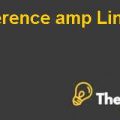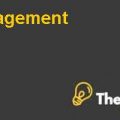Q5. Given that Alphabet’s search engine and advertising account for 90% of revenues, does it make sense to continue to fuel R&D ventures across so many subsidiaries? Can you think of another company that has done this? (Think examples I have given in class, or examples from text).
Some people at that time said Google are not spending enough in their research and development side but one academic said “research and development do not guarantee you”, he further added “companies like AT&T, IBM and Xerox spent heavily in research and development but they did not get the result they wanted”. “In 2005, Google acquired Android which was a small software company at that time and had estimated value of 50 million dollars.Larry Page, Sergey and Eric had a bet at that time that smart phone are going to be most important and much-desired technology and how it will become a necessity after having internet in the mobile and you can search anything you want with one touch and they were proved right” said Google’s Vice President for engineering at Android Hiroshi Lock heimer. So their investment in research and development proved to be successful. In 2015, Google decided to spend all time highest 12% of their revenues in research and development.Facebook in 2015 spent 21% of their revenues on research and development as compared to 15% of Alphabet and 3.5% of Apple’s.
Q6. Does Alphabet appear to take a portfolio approach or a corporate parenting approach to managing their companies? (See textbook and class notes) Using the BCG matrix, try to identify Alphabet subsidiaries (past or present) that seem to fall into categories. What does this tell you about their portfolio management?
Alphabet appears to take a portfolio approach in managing their company. Prime example for that is their approach to restructure their organization which was opposed by many but that turned out as a huge success as Google spent more on its business, products and for the market of its business. Google acquired YouTube a popular online video site in 2006 for 1.65 billion dollars. That was stated as beginning of the revolution of internet videos. At that stage people thought it is a huge risk as they cannot predict that whether or not people will come to this site in huge numbers and they were unsure that top advertiser will hesitate to come. Later on in 2006 it turned out to be a huge success but its effects on the profits of alphabets are still unclear. Google has started several other projects which are working fine now there were few which were not successful but mostly Google’s projects resulted in great success.
BCG Matrix of Alphabet:
Alphabet Star:
The star of Alphabet has always been Google and in Google its Home and Google search engine which is contributing heavily in Alphabet’s annual revenue. Google home shipment is one of the largest and highest earner around the world and Google search engine is the most used search engine for almost over two decades now and it will continue to be the most dominating search engine for decades to come.
Alphabet Cash Cow:
The cash cow for Google is Google advertising which is contributing up to 80% in their annual revenues. Google advertisement has really helped them to achieve new heights and it has provided maturity to the company. The other is Nest Labs, which is the subsidiary of Alphabet providing smart household appliances. Nest Lab was acquired by Google in 3.2 billion dollars which was the second largest purchase by Google at that time.
Alphabet Question mark:
Question mark in Google is Google cloud services with low market share contribution to the annual revenues. They also made a product for medical side verb surgical but that could not standout because of some internal conflicts.
Alphabet Dog:
Google fiber is the dog as it is contributing least to the organization. Other was Google Wave which was a live messaging platform and in less than 6 months Google pulled it back as it was a failure and people were not liking it and not too many people used that platform which resulted in Google deciding to pull out Google Wav
Q7. Is Alphabet overly diversified?
Alphabet is not overly diversified and it is continuously progressing and achieving new heights of success. They started this initiative by taking inspiration form Warren Buffet which was innovate and diversified their range of products and subsidiaries. It cannot be labelled as overly diversified as they had long term plans and to achieve that you just cannot stick to one line you have to keep growing and expanding your business in order to survive in the market.
Q8. What are some of the governance problems that are identified in the case? How might this impact them going forward?
First of all Google’s relation with their investors were not good they were not on the same page from the beginning and had conflicts at each stage since the introduction of classes of voters in decision making, in which investors had the least voting rights as compared to the internals of the company who had the most voting rights and there is another class C which had zero voting rights despite being a shareholder of the company. Investors were shouting for equal right opportunity but the organizations gave them the value in this context. When Google offered IPO’s, Institutional shareholder services, it gave them the lowest ranking in corporate governance among all 500 fortune firm. (Juan Alcacer, 2018)......
This is just a sample partical work. Please place the order on the website to get your own originally done case solution.












